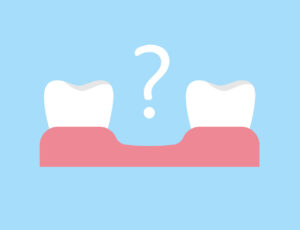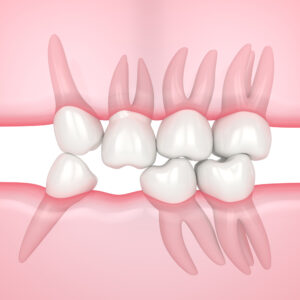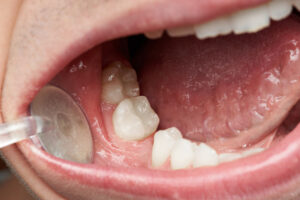Does a Missing Tooth Need to be Replaced?
 If you are missing a tooth, you may have asked yourself this question. Does that tooth really need replacement? It is an important question to ask, and the answer is not always yes. It is usually yes, but not always.
If you are missing a tooth, you may have asked yourself this question. Does that tooth really need replacement? It is an important question to ask, and the answer is not always yes. It is usually yes, but not always.
We want our patients to understand why we recommend various treatments. Our goal is always to maintain or improve your oral health. In the case of a missing tooth, replacing it is usually the best choice.
Here are some of the considerations that factor into our making that statement.
Which Tooth is Missing?
One important factor in the choice to replace a missing tooth is which tooth it is. Most everyone is ready and willing to replace a missing front tooth, or one that is visible in the smile. Unfortunately, those teeth are actually easier to go without when it comes to chewing function.
People are often willing to go without a molar for cosmetic reasons, but a missing molar drastically reduces your chewing ability. Because wisdom teeth do not contribute to chewing forces, they are the only teeth that we never replace.
The larger a tooth’s biting surface, the more important its replacement is! This means that missing first molars should be replaced in almost every situation.
Whet are the Risks of Not Replacing my Missing Tooth?
The reason you should consider replacing a missing tooth is that there are long-term consequences the missing tooth causes. Here are a few of the most important ones.
Loss of Chewing Ability
Each tooth is designed to bear a specific burden during chewing function. When even a single tooth is missing, your chewing ability can become impaired. Chewing is the first step in the digestion process. It mechanically breaks food down into smaller, more easily digested particles. It also uses salivary enzymes to chemically break down food. Without proper chewing, you’d cannot properly digest food.
 Movement of Surrounding Teeth
Movement of Surrounding Teeth
Another potential consequence of a missing tooth is the collapsing of the surrounding teeth into the missing tooth’s space. This movement is not just an orthodontic problem. It can also lead to changes in the bite that affect the teeth, gums, muscles and joints.
Increased Wear and Tear on Remaining Teeth
The teeth remaining in the arch often suffer from an increased risk for dental problems like gum recession and fractures. As the teeth shift and the bite changes, the remaining teeth are subjected to different forces. These can cause changes to the gums and the amount of biting force each tooth receives.
What are my Options to Replace a Missing Tooth?
There are multiple ways to replace a single missing tooth. If you have multiple missing teeth, there are additional options to consider. For this article’s purpose, we will be discussing only the replacement of a single missing tooth.
Dental Implant
A dental implant is the best way to replace a single missing tooth because it does not negatively affect the neighboring teeth. An implant anchors into the jawbone, like a natural tooth does. It does not require support from adjacent tooth or gum structures. It restores chewing function very well. In most cases, it can also produce a cosmetically pleasing result.
Dental Bridge
A bridge is a dental restoration that uses two neighboring teeth (one on each side) to support a replacement tooth between them in the missing tooth’s space. Bridges require two relatively healthy adjacent teeth. That means a bridge is not an option when your missing tooth is the last one at the back of the mouth. Bridges can also provide very nice cosmetic results, so they are often a good choice for missing front teeth.
Partial Denture
A “partial” is a removable option to replace a missing tooth or teeth. Partials are not great tooth replacement treatments for a single missing tooth, so we typically only use them as a temporary replacement. A partial does require the support of other teeth in the arch, but it does not damage the teeth as extensively as a bridge does.
I Can’t Afford to Replace it Now. Can I Do it at a Later Time?
We understand that missing tooth replacements are expensive. The great news is that they are worth it! They restore your chewing ability, which supports good overall health. However, what if you cannot afford to replace your missing tooth at this time?
 Yes, you can replace missing teeth even years after the tooth was pulled. There are some important considerations while you wait, though.
Yes, you can replace missing teeth even years after the tooth was pulled. There are some important considerations while you wait, though.
First, you need to consider wearing a retainer or mouthguard during sleep to help hold the teeth in place. This prevents the shifting that often occurs when a tooth is missing. It also helps maintain the stability of your bite.
If the replacement option you would like to choose is a dental implant, the quantity and quality of jawbone in the missing tooth site is important. Some people lose bone rapidly after the extraction of the tooth. Others do not. Dr. Ann can precisely measure your bone to answer the question about whether you have enough. The good news is that even when bone is deficient, we have options to augment it for a future dental implant.
More Questions about Missing Tooth Replacement?
Call Designer Smiles today to schedule a consultation with Dr. Ann. She can answer any question you have about your specific missing tooth and the long-term consequences you may face, as well as your replacement options. We love helping our patients replace missing teeth and restore their ability to chew well!
